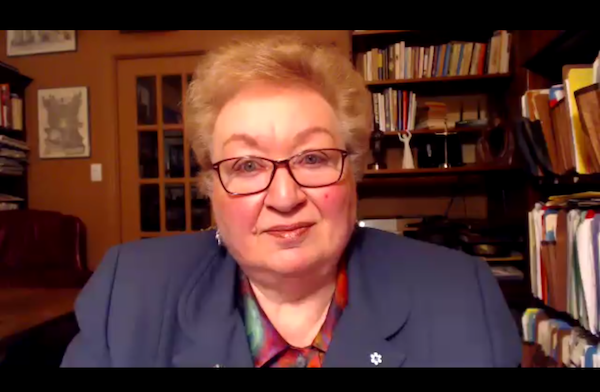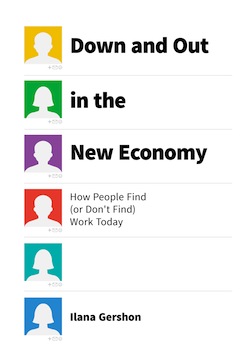Linda Silver Dranoff kicked off the four-part National Council of Jewish Women of Canada Women and Justice speaker series on Sept. 23. (screenshot)
National Council of Jewish Women of Canada started its four-part Women and Justice Speaker Series on Sept. 23 with retired family law lawyer Linda Silver Dranoff, who lives in Toronto.
The online setting allowed NCJWC members from across the country to be involved. The talk was opened by national president Debbie Wasserman, in Toronto, and closed by co-vice-president Debby Altow, in Vancouver; the question-and-answer period was handled by a committee chair, Bianca Krimberg, in Calgary.
Silver Dranoff’s talk was sobering, explaining how women in Canada have been defined by their subordinate role in the family, in relation to a man. She gave examples of laws that have reinforced this status, but also offered possible solutions, as legal reform has been an important part of her career. Among the books she has written is a memoir, called Fairly Equal: Lawyering the Feminist Revolution.
“Throughout human history, women were unprotected and vulnerable. Husbands controlled the purse strings, all property, any pension and the children,” she said. “A woman did not even own her own clothing, which was called ‘the wife’s paraphernalia.’ Women and children were property, not people. Once a woman was married, she was stuck, even if her husband beat or starved her. What we call domestic violence was considered, until very recently in human history, a private family matter that the state and the community did not get involved in.
“There was no divorce law in Canada until 1968,” she continued. “If a woman was guilty of marital misconduct, such as adultery, she could lose her right to have custody of her children and often even access to visit with them.”
Silver Dranoff became a lawyer in family law in 1974. At the time, she witnessed women staying in abusive marriages because they had little choice – if they left, they could become destitute and lose their children, too. “Marital misconduct ended any right to financial support, even if it happened after separation and divorce,” she said, explaining that settlement agreements often included a dum casta clause, a “while chaste” clause.
If a woman left her abusive husband, she said, anyone helping or harbouring her could be charged as a criminal. “This was an offence in our criminal law until the 1970s – that’s how recently it was. The law permitted a man to disinherit his wife and leave her destitute, no matter how long they’d been married and even if she was the model of a perfect wife.
“The husband controlled the wife’s reproduction. Contraception and abortion were criminal offences. A husband and wife were considered one person in law – the husband. This concept of the legal unity of husband and wife is what allowed a man to control his wife in every respect.” Until 1983, a husband could legally rape his wife – “marriage was considered consent to conjugal relations,” explained Silver Dranoff, who stressed that, of course, many men didn’t take advantage of their power – “but those who did could do so with impunity” and with legal sanction.
In addition to these restrictions, married women were discouraged from working outside the home. “In 1941,” said Silver Dranoff, “fewer than four percent of married women were employed. It wasn’t until 1955 that married women were eligible to be employed in the federal civil service. In any event, there was almost no publicly supported childcare – this actively discouraged women from employment. Even if women worked, usually out of necessity, there were no laws protecting them from discrimination in employment.” This meant that women could legally be paid less, disregarded for promotion consideration and fired if a man needed a job. “There was no law against sexual harassment in the workplace; it didn’t even exist until the early 1980s in law.”
In the public arena, said Silver Dranoff, “women were invisible.” While most women have had the right to vote since 1918 – a right won by the efforts of the first-wave women’s movement – government policy usually overlooked issues of concern to women. “Only five women were elected to Parliament before 1950,” she said. “It wasn’t until 1957 that the first woman ever was appointed as a federal cabinet minister. And a woman lawyer was a rarity – in 1951, there were 197 women lawyers in all of Canada out of a total of 9,000.”
This was the world in which Silver Dranoff grew up, and it energized and impelled her to action, as it did others. “I believe the most significant transformation allowing women a less dependent role in society came about when women could control our reproductive powers,” she said. “The birth control pill was developed in 1961. While contraception and abortion were still criminal offences, the pill gradually became publicly available in the 1960s, and that is when the second-wave women’s movement began.”
Women’s groups proliferated in the 1970s and 1980s. “The National Action Committee on the Status of Women comprised most of the major women’s organizations of the day, totalling, at its height, 700 women’s organizations that all gathered together to promote the rights of women with one voice.”
Silver Dranoff went to law school in 1969. She was a single parent with a 2-year-old and had been out of school for eight years. “Other women were also seeing a life outside the family as a possibility,” she said. “In my law school class, there were 14 women out of 300; we were five percent of the class. Had I attended eight years earlier, when I graduated from history, I would have been the only woman in a law school class in Toronto.”
With more women lawyers, there was more pressure for change and Silver Dranoff spoke about some of the advances that have been made in family law reform, Charter equality rights, abortion, violence against women, childcare, pay equity, and representation and power.
When Silver Dranoff came to the bar in 1974, women had no right to share property accumulated during a marriage, and spousal and child support amounts were “paltry and difficult to enforce.” By the 1980s across Canada, improvements had been made both in multiple laws and in their enforcement. “These changes enabled women to leave bad marriages and live independently,” she said.
However, there is more to be done. Husbands and their lawyers still “use the legal system and its processes and delays as a club to intimidate women.” As well, she added, “It is often too expensive to seek the rights which the law gives, and legal aid is severely underfunded.” Another problem is that mediation and arbitration are replacing the courts in some cases and, “as a result, women may be encouraged to make a deal that doesn’t give them the benefit of the laws we fought long and hard for.”
When the Canadian Constitution was repatriated from Great Britain in 1982, a new Charter of Rights and Freedoms was enacted. Women’s groups lobbied the government of the day, led by then-prime minister Pierre Trudeau, “to include constitutionally entrenched equality rights in the Charter – by the way, a right that American women still don’t have. Our women lawyers provided the wording to protect us, using the lessons taught by the ineffective Bill of Rights passed in the 1950s.”
One of those lessons was the need to make sure the rights were actually protected. “We had to lobby, we had to organize, we had to participate in court cases that would affect our equality rights. So, we founded the Women’s Legal and Educational Action Fund, known as LEAF, in 1985, when equality rights came into effect, to try and ensure that court interpretations of the Charter did not erode, but enhanced and ensured women’s equality rights.”
In the late 1960s, Trudeau, as justice minister under then-prime minister Lester B. Pearson, brought in amendments to the Criminal Code that permitted abortion under defined conditions. The amendments did not legalize abortion, but said the prohibition would not operate if a medical committee deemed a pregnant woman’s life to be in danger if she carried to term. This law did not work, said Silver Dranoff. Among other things, there was inconsistency among hospital abortion committees in rulings and there were no guidelines on what constituted endangerment.
“Dr. Henry Morgentaler became women’s champion,” she said. “He opened a clinic in Montreal and women traveled there from across Canada to be assured of getting and having a safe abortion.”
Morgentaler challenged the medical committee law, she said, and his goal was to get abortion removed as an offence under the Criminal Code; he also challenged provincial laws. “The main challenge was decided in 1988 by the Supreme Court of Canada,” said Silver Dranoff, “which agreed with defence counsel’s constitutional argument that the abortion provisions of the Criminal Code breached the rights of Section 7 of the Charter to life, liberty and security of the person and, therefore, was unconstitutional.”
There is no longer any federal law preventing or criminalizing abortion, or requiring anyone’s consent to the procedure other than that of the pregnant woman. There have been challenges to the change, though, including the federal government under then-prime minister Brian Mulroney, which tried twice – unsuccessfully – to form an anti-abortion law that wouldn’t violate the Charter.
“This shows how important it is to keep vigilant and organized and focused,” said Silver Dranoff. “There’s no such thing as a permanent victory, only a continuing struggle.”
A case in point is the progress that has been made with respect to dealing with violence against women. The courts used to accept the argument that, if a woman had ever had sex before with anyone, she probably consented to the approach by the accused. Victims can no longer be cross-examined on their previous sexual experience, unless the trial judge determines there is some compelling reason to allow it, said Silver Dranoff. However, “victims are still being mistreated by the courts,” she said. “As a result, many women are reluctant to complain.”
In addition to a need for more education of lawyers, police and others in the system before attitudes will change, Silver Dranoff spoke of the need for prevention, offering the example of proactive imprisonment, which is practised in some communities in the United States. Whereas a bail hearing assesses whether an accused is likely to flee before trial, this process assesses how likely an accused is to murder their accuser. If the risk of murder is high, the accused would be imprisoned until their trial and the victim (and their children) would be able to stay at home instead of having to seek shelter and protection, for example.
“I think it’s a plan that’s worthy of consideration in Canada,” said Silver Dranoff. “We also need gun control. In the hands of men who are violent against women, guns are dangerous. And the only way to control violent men using guns is to control guns. Canadian statistics show that access to firearms by an intimate partner increases the likelihood of murder by 500%.”
Childcare is another integral issue, she said. “I personally think that women will never be able to take their full place in our workforce unless we have proper health- and childcare. We need government-paid, government-subsidized childcare centres, regulated places for our children to go and be cared for while women are employed in the paid labour force.”
She said that, 50 years ago, in 1970, the importance of childcare was recognized in the Royal Commission on the Status of Women, “which called for a national childcare plan. The royal commission identified the care of children as the responsibility to be shared by mothers, fathers and society, without which, women cannot be accorded true equality. Just as true today as it was in 1970.”
She pointed to other instances in which a national childcare program had been recommended or dismissed by a federal government. Most recently, on Sept. 23, Prime Minister Justin Trudeau’s government “announced plans for a significant long-term investment in a national childcare and early-learning system, including before- and after-school care, and built on the [publicly funded] Quebec model.”
Silver Dranoff warned that government announcements, and even the making of laws, do not necessarily translate into changes. In Ontario, for example, there have been equal pay laws since 1951, she said, while the Pay Equity Act, which applied to the federal public service, didn’t come until 1984. Changes to the various laws have occurred as a result of complaints from workers, she said, and different governments and employers have either progressed or hindered pay equity.
“Statistics tell the story, too,” she said. “In 1965, women earned, on average, 41% of men’s pay…. Today, Ontario women earn, on average, 70 cents for every dollar a man earns.” While an improvement, it took more than 50 years and it’s not good enough, she said. “These statistics repeat themselves all over the world. Women are still paid less than men in every country in the world, according to research by the World Economic Forum.” And the pay gap is even larger for Indigenous, racialized and immigrant women, she said.
Potential solutions include a law requiring pay transparency, wherein a wage is assigned to a particular job, not the gender of the person filling it, and requiring companies to get equal pay certification from the government or be fined. The latter policy has been implemented in Iceland, she said.
After a few more examples of ways to improve pay equity, Silver Dranoff moved on to her final topic – representation and power. She noted that, in 2013, there were six female premiers, now there is only one (Caroline Cochrane, in the Northwest Territories).
“We need more women in positions of power and we’re having great difficulty in achieving it,” said Silver Dranoff. One deterrent is that women in politics receive significantly more abuse and nastiness than male politicians. Much of this abuse is online in social media and even anonymous; two factors contributing to the fact that few perpetrators are charged or convicted.
She said, “The law could be strengthened in this way: make social media platforms legally responsible for the content they post, just as newspapers have a responsibility to ensure that the content they print is not defamatory.”
She noted there are no provisions in the Criminal Code for online bullying, online criminal harassment, online misogyny. “The Criminal Code only deals with in-person offences,” she said. Of course, to make these types of new laws work, she added, anonymity on the internet must be curtailed or eliminated.
To sustain the advances made by the women’s movement, she said, “Feminists must run for office and be elected. Parties must nominate feminists in electable ridings.”
In Silver Dranoff’s use of the term, feminists can be any gender, just as patriarchs can be any gender. Not every woman, she said, will stand up for the interests of women.
In addition to electoral reform – she believes that proportional representation of the mixed member proportional type is the best bet, “both for society as a whole and for women in particular because it requires consensus decision-making” – Silver Dranoff would like to see changes made in the corporate world, as well. She sees a need for things like mandatory quotas for women on boards, to ensure equal representation. “Voluntary doesn’t work,” she said.
Canada also needs a national women’s organization, she said, “like we had in the early days of the women’s movement. The National Action Committee on the Status of Women represented all of us…. We need that national voice to ensure that women’s issues are monitored and our interests are heard.”
Such an organization should not be dependent on government funding, she said, “which can be, and has been, withdrawn due to the ideology of the day. And, in fact, that’s what happened to NAC in the end. The National Action Committee was relying on government funding and an unsympathetic government removed it.”
Women cannot just accept the status quo, she said, or “that makes us complicit.”
She concluded, “My message to you all is carpe diem, seize the day. There is work to be done. It is, without a doubt, long past time for women to achieve equality and justice.”
***
Note: This article has been amended to make clear that it was married women who weren’t permitted to work in the federal public sector until 1955.




